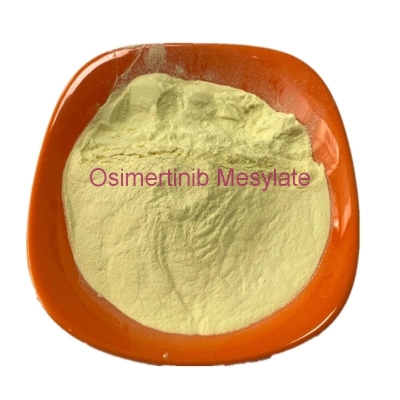-
Categories
-
Pharmaceutical Intermediates
-
Active Pharmaceutical Ingredients
-
Food Additives
- Industrial Coatings
- Agrochemicals
- Dyes and Pigments
- Surfactant
- Flavors and Fragrances
- Chemical Reagents
- Catalyst and Auxiliary
- Natural Products
- Inorganic Chemistry
-
Organic Chemistry
-
Biochemical Engineering
- Analytical Chemistry
- Cosmetic Ingredient
-
Pharmaceutical Intermediates
Promotion
ECHEMI Mall
Wholesale
Weekly Price
Exhibition
News
-
Trade Service
On September 30, 2022, the "CSCO Autologous Transplantation Working Group 2022 Tour - Guizhou & Yunnan & Guangxi Station" hosted by the Chinese Society of Clinical Oncology (CSCO), CSCO Lymphoma Expert Committee, CSCO Leukemia Expert Committee, CSCO Autologous Hematopoietic Stem Cell Transplantation Working Group, and undertaken by the Affiliated Hospital of Guizhou Medical University and Yunnan Cancer Hospital was successfully held
online.
Professor Wang Jishi of Guizhou Institute of Hematology, Affiliated Hospital of Guizhou Medical University, and Professor Lai Xun of Yunnan Cancer Hospital served as the chairmen of the
conference.
At the same time, well-known experts in the field were invited as speakers and commentators to discuss the current situation and progress
of autologous hematopoietic stem cell transplantation (ASCT) in China.
This article has compiled the key contents of the conference for the readers
.
speech
At the beginning of the meeting, the chairmen of the conference, Professor Wang Jishi and Professor Lai Xun, delivered opening speeches
in turn.
Professor Wang Jishi said that he is very pleased to gather here with all colleagues to focus on the application of ASCT in multiple myeloma (MM), lymphoma and other hematological malignancies, share the application experience of ASCT, and sort out the confusion
in clinical and practical applications.
I wish this meeting a complete success and promote the progress of
ASCT in the western region.
Professor Lai Xun said that it is a great honor to communicate with many well-known hematology experts and clinical front-line workers in China today, and I hope that everyone here can gain
something from this meeting.
Professor Wang Jishi delivered the opening speech
Professor Lai Xun delivered the opening speech
session
After the opening ceremony, the academic session was
in full swing.
The first part of the academic report was chaired by Professor Zhou Hui of
Hunan Cancer Hospital.
Professor Zhou Hui served as the chair of the first part of the academic report
Professor Ma Jun of Harbin Institute of Hematology and Oncology gave a report entitled "Current Status and Prospect of Autologous Hematopoietic Stem Cell Transplantation in China".
This report counts a total of 5,221 ASCT cases
reported by 211 centers in 29 provinces and cities in China in 2021.
Compared with Europe, the United States and Japan, the total number of ASCT cases in China is small, the number of cases of secondary transplantation is small, the age distribution of patients is relatively young, and ASCT in China still has a lot of room for
development.
Of the 5221 ASCT cases, 46 (0.
9%) died within 100 days, meeting international standards (<2%)<b23>.
From the analysis of ASCT utilization, a total of 2443 patients with lymphoma first ASCT, accounting for 2.
4%, and myeloma patients 2113 patients, accounting for 11.
3%, the proportion is still low
.
In the past few years, a number of multicenter retrospective and prospective studies have been conducted in China, and the results show that ASCT can bring good survival benefits to lymphoma and myeloma patients; On the whole, ASCT in China is not developed enough, high-level evidence-based medical evidence is lacking, and it is urgent to cultivate professional personnel and teams to carry out more high-quality clinical studies
suitable for Chinese patients.
Professor Ma Jun made a report
Professor Luo Le of the 920th Hospital of the Joint Logistics Support Force of the People's Liberation Army of the Chinese People's Liberation Army reported on the development of ASCT, the status of ASCT, the goal of pre-transplant treatment, the progress of stem cell mobilization, as well as the timing, frequency and requirements for patients with the topic of "Myeloma Autotransplantation Treatment"
.
Professor Luo Le mentioned that ASCT has been the main transplant in Europe for 30 years, and it has always been on the rise
.
MM is the most common indication for ASCT in the United States, while the proportion of ASCT patients in China is low, and the gap between ASCT in China and European and American countries still needs to be narrowed
.
In the era of new drugs, the position of high-dose chemotherapy (HDT)/ASCT can not be replaced, and the clinical benefits of RVd (lenalidomide + bortezomib + dexamethasone) induction therapy + ACST + RVd consolidation therapy are more significant
than RVd induction therapy + consolidation therapy regimen.
Achieving ≥ very good partial response (VGPR) or complete response (CR) with pre-transplant induction therapy lays the foundation for long-term disease control, with the higher goal of achieving minimal residual disease (MRD) negativity
.
Impaired renal function is not a contraindication to ASCT, and high-dose chemotherapy combined with ASCT is also an appropriate treatment for patients with moderate to severe renal impairment
.
Professor Luo Le made a presentation
The discussion session was moderated by Professor Wang Xin of Shandong Provincial Hospital, and the guests were Professor Zeng Yun of the First Affiliated Hospital of Kunming Medical University, Professor Xu Jingyan of Nanjing Gulou Hospital and Professor Bao Guoxiu of Dali Bai Autonomous Prefecture People's Hospital Professor Luo Le had in-depth discussions on "the feasibility of secondary transplantation in China", "how to choose CAR-T and ASCT under the same accessibility conditions", "the combination of CAR-T and ASCT", and "the selection and use of drugs in the post-transplant maintenance therapy stage", and the academic atmosphere was strong
.
Professor Wang Xin chaired the discussion part of the first session
The second part of the academic report continued to be chaired
by Professor Wang Xin.
Professor Wang Xin served as the chair of the second part of the academic report
Professor Zhao Peng of the Affiliated Hospital of Guizhou Medical University gave a detailed interpretation of the "Application Progress of Bendamustine in ASCT and CAR-T Pretreatment", which included the clinical application of ASCT, the improvement of ASCT pretreatment program for lymphoma and myeloma, and the improvement of CAR-T pretreatment program
.
Professor Zhao Peng said that in the era of new drugs, the status of ASCT is still unshakable, and the selection of appropriate pretreatment is crucial
to the success or failure and efficacy of ASCT.
At present, lymphoma ASCT is dominated by BEAM (carmustine + etoposide + cytarabine + melphalan) pretreatment regimen, but the incidence of carmustine-related pulmonary toxicity is 16%-64%, which cannot be ignored
.
Therefore, replacing some drugs in the classical regimen to improve efficacy and reduce the incidence of complications is one of
the current exploration directions.
At present, myeloma ASCT is mainly based on MEL200 (melphalan 200mg/m2) pretreatment regimen, and some studies have explored the application of bendamustine combined with high-dose melphalan in MM, and the results show that bendamustine combined with high-dose melphalan is safe and effective
for the pretreatment of primary and secondary ASCT.
In addition, a number of clinical studies have demonstrated the efficacy and safety of bendamustine in CAR-T pretreatment, which is worthy of further in-depth study
.
Professor Zhao Peng made a report
Professor Liu Weiping, Peking University Cancer Hospital, gave a detailed report entitled "Progress of Lymphoma Autologous Transplantation".
Professor Liu Weiping said that the recurrence progression rate and OS rate of CAR-T treatment after the rescue therapy of patients with retreated diffuse large B-cell lymphoma (DLBCL) reached PR for 2 years, and the OS rate was 47%; The 2-year recurrence progression rate with ASCT is 40% and the OS rate is 69%, although the clinical benefit of CAR-T and ASCT has yet to be compared
in head-to-head studies.
In addition, ASCT patients with primary central nervous system lymphoma had a significant efficacy, with an 8-year recurrence-free survival rate of 94.
1%.
Compared with the non-transplant group, the 2-year OS rate was 20%
higher in the transplant group in patients treated with Hodgkin lymphoma.
In the era of new drugs, we should actively embrace new drugs and new therapies and combine ASCT to bring better survival benefits
to patients.
Studies have shown that for patients with TP53 mutation R/R BCL, CAR-T combined with ASCT treatment has a better effect than CAR-T therapy, and the 2-year OS rate is 89.
3% vs.
56.
3%,
respectively.
It can be seen that CAR-T combined with ASCT is a promising combination plan
for the treatment of patients with R/R DLBCL.
The value of new drugs should be reflected in salvage therapy to improve treatment efficiency and patient depth of
remission.
How ASCT can be combined with new drugs and new efficacy is worth further exploration
.
Professor Liu Weiping made a report
The subsequent discussion session was chaired by Professor Lai Xun, and was held by Professor Li Xiaoyan of Baoshan People's Hospital, Professor Nie Bo of the First Affiliated Hospital of Kunming Medical University, and Professor Zheng Chaoen of Puer People's Hospital Professor Duan Ci of Yunnan Cancer Hospital participated in the discussion, and had wonderful exchanges and discussions on "the proportion of sinus bradycardia and subsequent treatment methods in the clinical application of bendamustine", "whether BEAM regimen or high-dose melphalan should be selected for pretreatment of high-risk MM patients", "treatment of digestive tract and oral mucositis after chemotherapy" and "whether patients can be transplanted early when patients reach CR very early
。
Professor Lai Xun chaired the discussion part of the second session
of the meeting
At the end of the meeting, the chairmen of the conference, Professor Lai Xun and Professor Wang Jishi, made a summary
of the conference.
They said: Thank you to all experienced experts for bringing us wonderful speeches! The development of ASCT in western China still needs to be improved, and it is expected that future hematology workers will work together to continue to explore the application of ASCT, strive to improve ASCT technology, bring more benefits to hematological cancer patients, and strive
to achieve better clinical cure.
Professor Wang Jishi and Professor Lai Xun summarized the meeting
Poke "Read Original" to see more







